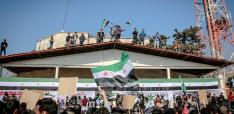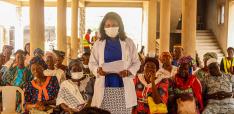Rhetoric is not enough: Solidarity in global health requires transformative change

Rajat Khosla and David McCoy argue that correcting power imbalances and ensuring accountability are at the heart of transforming the global health agenda.
The last few years have seen calls and appeals by global health actors aimed at rallying the spirit of global solidarity and international cooperation in support of future pandemic preparedness among other things. Global solidarity is needed to tackle the huge inequities that exist across the world. International cooperation and effective multilateral institutions are needed to prevent the escalation of wars and to reverse the serious environmental threats facing humanity.
However, despite COVID-19 bringing into “sharp focus the interconnectedness, the indivisibility and inalienability of the human rights agenda from the global health, global development and global peace agendas”, rallying calls for global solidarity did not produce a fair and united response to the pandemic. Instead, self-interest dominated the actions of States and non-state actors, demonstrating the empty rhetoric of calls of solidarity.
With this experience in mind, it is worrying that the recently released draft of the Pandemic Accord, despite explicitly hinging upon the principles of solidarity and cooperation, is silent on the mechanisms with which to ensure compliance and accountability. There is overwhelming evidence on the centrality of accountability to the success of international accords. Others have similarly underscored that any legally binding international agreement on pandemic prevention and management will only work if effective accountability mechanisms exist.
This raises questions about how global health actors might champion solidarity and cooperation in global health (and more broadly), and in particular, what they can do to foster accountability. The conflict between Russia and the West, and rising levels of international tension, populist nationalism and mistrust more generally indicate that the challenge is great. But global health actors can contribute to overcoming this great challenge by focusing on meaningful reforms of the global health and international development systems. We suggest three areas of action.
First, global health actors can reduce power asymmetries within development financing and establish the more level playing field that would represent truer solidarity and cooperation. As noted by the Chair of the UK’s House of Commons International Development Committee, the “structure of the aid sector is beset by a fundamental power imbalance” and decisions about funding and policy are too often “taken in the offices of large, white-led organisations in the Global North”. Donors continue to “wield most of the power” and decide what gets done and by whom. Such power asymmetries perpetuate the idea of global health as a “humanitarian rescue mission to the Global South,” and excludes those most affected by decisions in the aid sector from making them.
The “global south” however is unlikely to be swayed anymore by models of charity and patronage. It is time instead to resurrect the principles and pledges of the Paris Declaration on Aid Effectiveness, the International Health Partnership agreement and the 2008 Accra Agenda for Action which called for alignment around national plans and priorities, harmonisation between development partners, transparency and mutual accountability. We can advocate for new forms of financing such as the Global Public Investment model in which all countries participate in the co-design, co-financing and co-governance of public goods and services. And we can encourage further conversations about decolonising global health to help accelerate the dismantling of structures, ideas and processes rooted in a colonial past.
Second, we must correct the imbalance between the power of corporations to profit from health and the duty of states to promote and protect the rights of people. The Covid pandemic laid bare the impotence of states in negotiating fair, transparent and reasonable contracts for the financing, manufacture and supply of vaccines. The excessive profiteering that has been witnessed is underpinned by – among other things - an intellectual property rights regime that protects monopoly power at the expense of the public interest, as well as large-scale tax avoidance. The pharmaceutical industry and other corporate actors seem to operate with impunity in an accountability-free zone. We must demand meaningful accountability of corporations and insist on their duty and obligations towards society and human rights.
Third, we must renew and redouble efforts to enable the WHO to function more effectively. The idea of a WHO remains unassailable - it would be a natural consequence of any desire for true global solidarity and international cooperation. With all the inherent challenges of being both a political inter-governmental institution and a wide-ranging specialist, technical agency, the WHO will never be perfect or free from criticism. But for decades, the organization has been unnecessarily handicapped from the outside. If the WHO is to play its role as the legitimate structure for international health cooperation, there must be calls for an end to the conduct of member states who instead of championing cooperation, lead the WHO towards a policy paralysis.
A key requirement for ensuring true solidarity and cooperation is having appropriate and independent lines of accountability for all actors, and ensuring that power amongst different stakeholder groups is distributed more fairly. Furthermore, accountability mechanisms must include not just the capacity to monitor and review progress (or the lack of it) but also to provide remedies and impose sanctions as required.
This is easy to say. Shifting power, challenging actors with an interest in maintaining the status quo, and fostering trust and solidarity across different national, religious and ethnic identities is hard. There are no silver bullets. Fundamentally, this is a political and moral challenge that will require the mobilisation of will, ambition and hope to overcome deep-rooted structural barriers. It will require bold and inspiring leadership, and it will depend on civic mobilization from the ground up. The time to forge a new social contract for global cooperation and build a better system to help deliver global health for all is now.
Rajat Khosla is Director, and David McCoy is Research Lead, at United Nations University-International Institute on Global Health (UNU-IIGH) – the UN’s think tank on global health in Malaysia.
Photo by Mikhail Nilov


